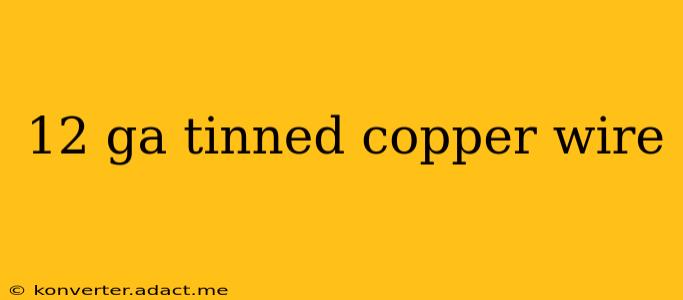12 gauge tinned copper wire is a versatile conductor used in a wide array of applications, from electrical wiring in homes and buildings to more specialized uses in electronics and manufacturing. Understanding its properties and applications is crucial for professionals and DIY enthusiasts alike. This guide will delve into the specifics of 12 gauge tinned copper wire, answering common questions and providing valuable insights.
What is 12 Gauge Tinned Copper Wire?
12 gauge tinned copper wire refers to a copper wire with a diameter corresponding to the American Wire Gauge (AWG) standard of #12. "Tinned" signifies that the copper conductor is coated with a layer of tin. This tin coating serves several important purposes, which we'll explore further. The gauge number itself indicates the wire's thickness – lower gauge numbers represent thicker wires, capable of carrying more current.
Why is Tinning Important?
Improved Corrosion Resistance: The primary benefit of tinning copper wire is enhanced corrosion resistance. Tin acts as a barrier, protecting the underlying copper from oxidation and other corrosive elements, extending the wire's lifespan, especially in humid or harsh environments.
Better Solderability: Tinning significantly improves the solderability of the copper wire. The tin layer creates a more uniform and reliable connection when soldering, leading to stronger and more durable joints. This is crucial in applications where reliable connections are paramount.
Enhanced Durability: The tin coating adds a layer of physical protection, making the wire more resistant to abrasion and damage during installation and use.
What are the Applications of 12 Gauge Tinned Copper Wire?
12 gauge tinned copper wire finds use in numerous applications due to its balance of current-carrying capacity and flexibility. Some common examples include:
- Residential Wiring: Frequently used for branch circuits in homes and apartments, supplying power to outlets and lighting fixtures.
- Commercial and Industrial Wiring: Employed in various commercial and industrial settings for similar purposes as in residential applications, though often with heavier-duty requirements.
- Automotive Wiring: While not as common as smaller gauges, it can be used in some automotive applications where higher current capacity is needed.
- Hobbyist Electronics: Useful for projects that require a balance of current capacity and ease of soldering.
- Grounding: Frequently used as a grounding wire to provide a path for fault currents to safely dissipate.
How Much Current Can 12 Gauge Tinned Copper Wire Carry?
The current-carrying capacity of 12 gauge tinned copper wire depends on several factors, including the type of insulation, ambient temperature, and installation method. However, under typical conditions, it can safely handle currents up to 20 amps. Always consult the appropriate electrical codes and standards for your region before making any electrical installations.
What is the Difference Between Tinned and Untinned Copper Wire?
The key difference lies in the tin coating. Untinned copper wire is more susceptible to corrosion and offers less reliable soldering. Tinned copper wire provides superior corrosion resistance and solderability, making it more suitable for applications where these factors are critical.
Is 12 Gauge Tinned Copper Wire Suitable for Outdoor Use?
Yes, 12 gauge tinned copper wire is suitable for outdoor use, provided it's used with appropriate weatherproof insulation. The tin coating offers protection against the elements, preventing corrosion and ensuring reliable performance.
Where Can I Buy 12 Gauge Tinned Copper Wire?
12 gauge tinned copper wire is readily available from various sources, including electrical supply stores, hardware stores, and online retailers. Always ensure you're purchasing wire that meets the relevant safety standards for your region.
This comprehensive guide provides a solid understanding of 12 gauge tinned copper wire. Remember to always prioritize safety and adhere to local electrical codes when working with electrical wiring. If you're unsure about any aspect of electrical work, consult a qualified electrician.
